Unit 4 Topic 3 The Internet makes the world smaller. Section B (共40张PPT,内嵌音频) 2023-2024学年八年级英语上册精品课
文档属性
| 名称 | Unit 4 Topic 3 The Internet makes the world smaller. Section B (共40张PPT,内嵌音频) 2023-2024学年八年级英语上册精品课 |
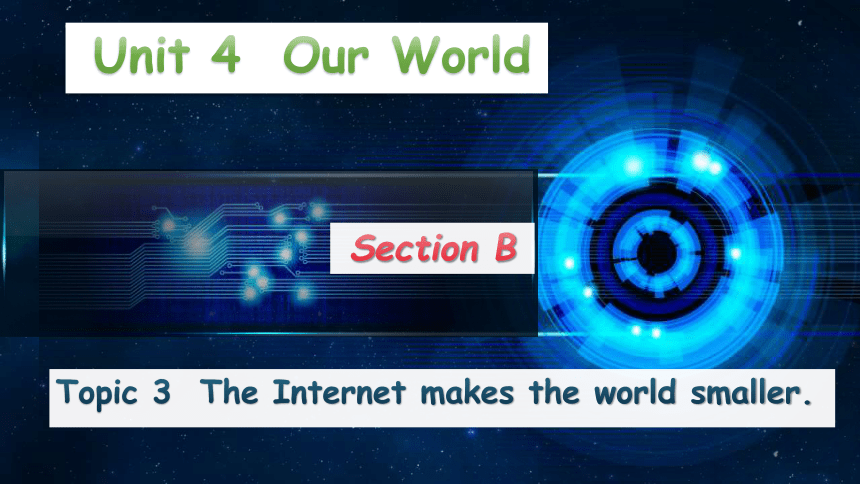
|
|
| 格式 | pptx | ||
| 文件大小 | 21.4MB | ||
| 资源类型 | 教案 | ||
| 版本资源 | 仁爱科普版 | ||
| 科目 | 英语 | ||
| 更新时间 | 2023-12-21 20:54:39 | ||
图片预览

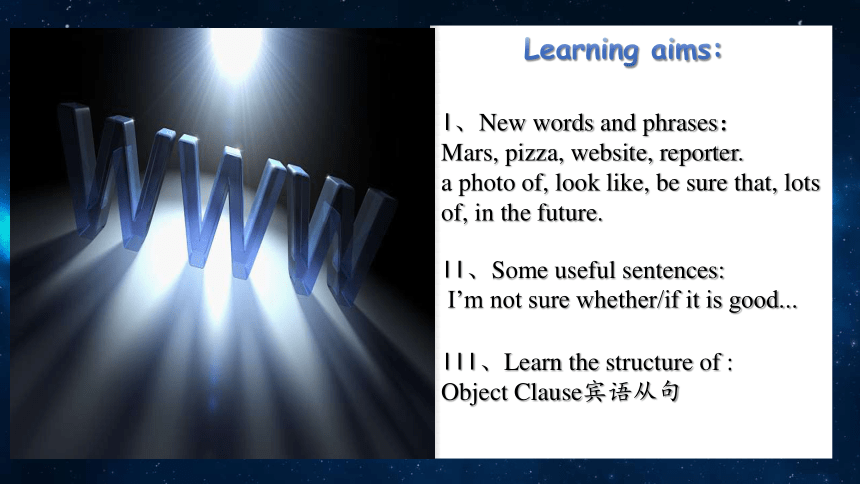

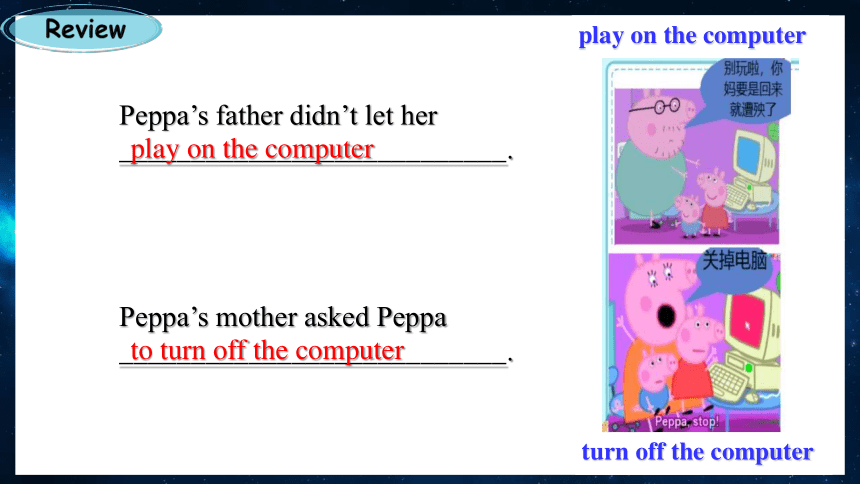
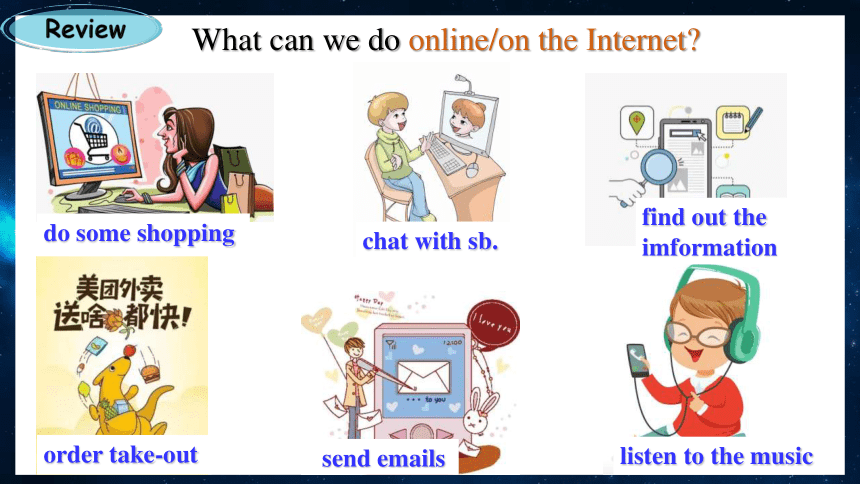
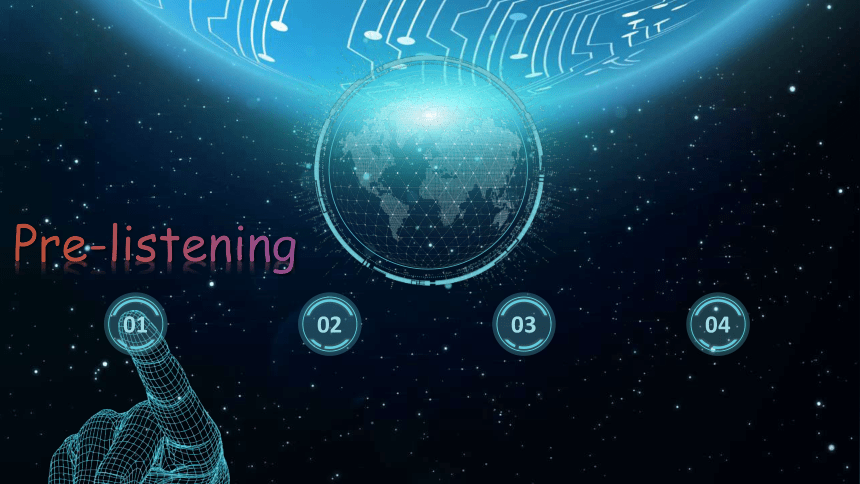
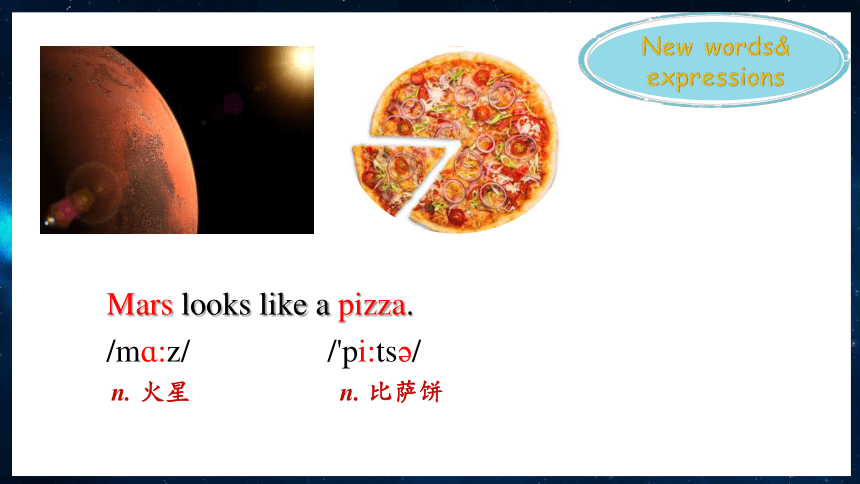
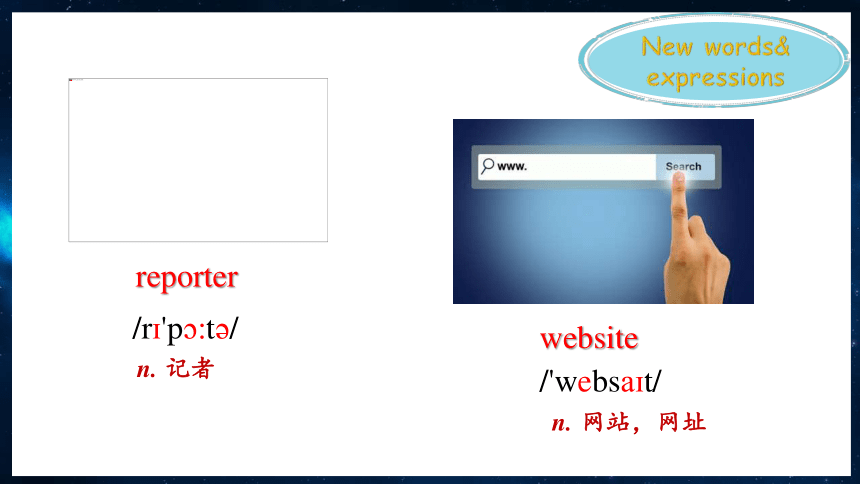
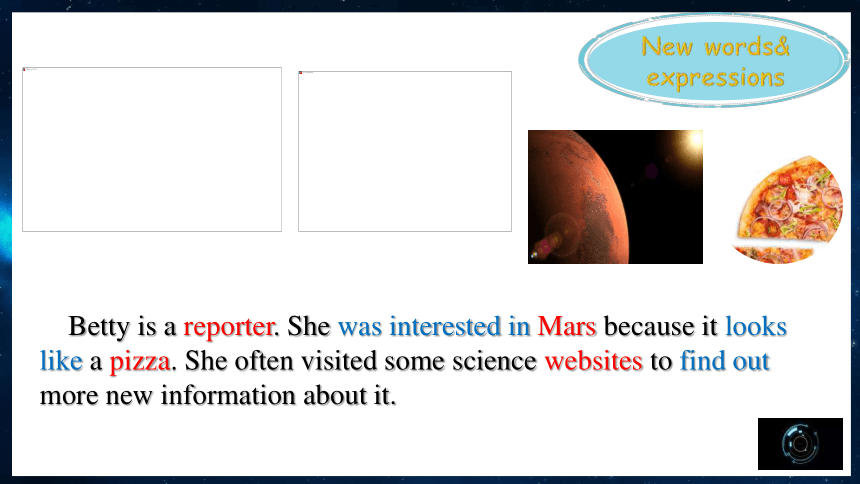
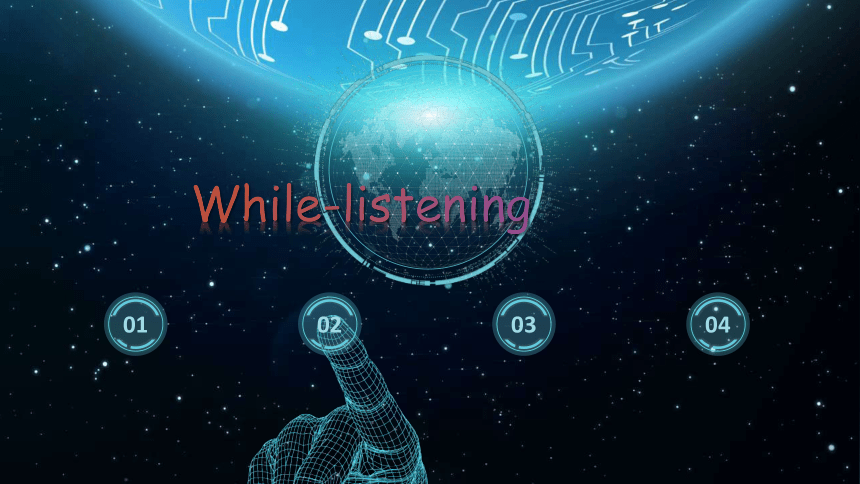
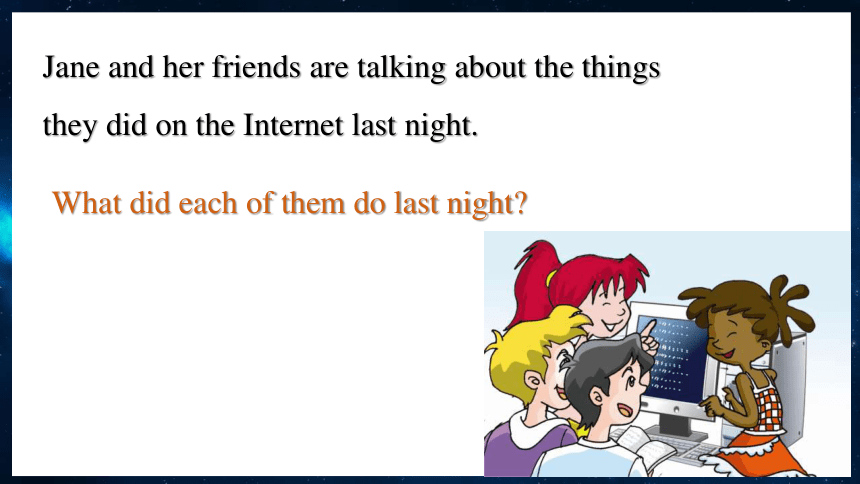
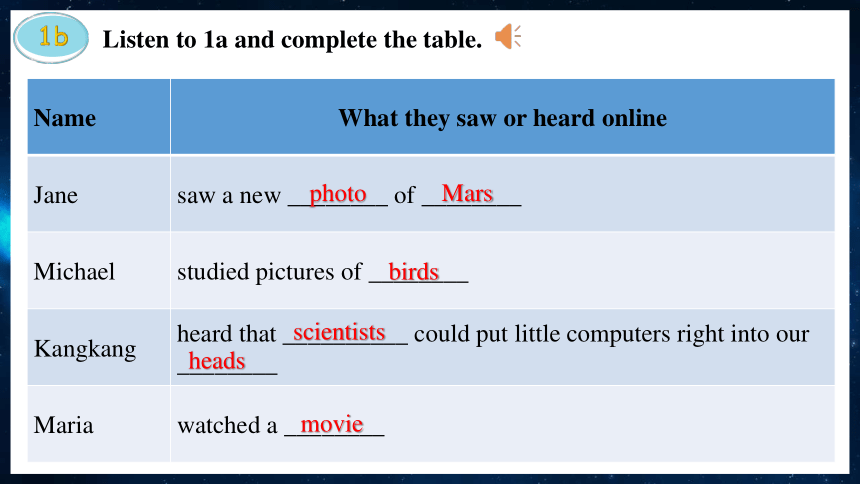
文档简介
(共40张PPT)
Unit 4 Our World
Section B
Topic 3 The Internet makes the world smaller.
I、New words and phrases:
Mars, pizza, website, reporter.
a photo of, look like, be sure that, lots of, in the future.
Learning aims:
II、Some useful sentences:
I’m not sure whether/if it is good...
III、Learn the structure of :
Object Clause宾语从句
Review
One day, Peppa’s father saw Peppa ___________________________.
play computer games
make Peppa happy
Computer games ___________________________.
playing computer games
make Peppa happy
Review
play on the computer
turn off the computer
Peppa’s father didn’t let her ___________________________.
Peppa’s mother asked Peppa ___________________________.
play on the computer
to turn off the computer
Review
What can we do online/on the Internet
do some shopping
find out the imformation
chat with sb.
order take-out
send emails
listen to the music
01
03
02
04
Pre-listening
/mɑ:z/
n. 火星
Mars looks like a pizza.
New words&
expressions
/'pi:ts /
n. 比萨饼
New words&
expressions
reporter
/r 'p :t /
n. 记者
website
/'websa t/
n. 网站,网址
Betty is a reporter. She was interested in Mars because it looks like a pizza. She often visited some science websites to find out more new information about it.
New words&
expressions
01
03
02
04
While-listening
Jane and her friends are talking about the things they did on the Internet last night.
What did each of them do last night
1b
Listen to 1a and complete the table.
Name What they saw or heard online
Jane saw a new ________ of ________
Michael studied pictures of ________
Kangkang heard that __________ could put little computers right into our ________
Maria watched a ________
photo Mars
birds
scientists
heads
movie
Listen again and mark T (true) or F (false).
And try to find the mistakes.
1. Michael saw a new photo of Mars on the Internet
last night. ( )
2. Jane thought Mars looked like a big red plate of pizza. ( )
3. Michael studied pictures of birds for his science lesson. ( )
4. Kangkang watched a movie from the Internet. ( )
5. Maria visited her favorite news website online ( )
F
T
T
F
F
Jane
Maria
Kangkang
1c
Rewrite the conversation into a passage based on 1b.
Last night, Jane ____________________________________
and Michael also ____________________for his science lesson. Kangkang visited his favorite website and heard a reporter say _________________________________________________
He was not sure if that was a good idea.
Maria _______________online and she was sure no scientist was going to put a computer into her head.
saw a new photo of Mars on the Internet
looked at photos online
scientists could put little computers right into our heads
watched a movie
1a
Look, listen and say.
Jane: Guess what! I saw a new photo of Mars on the Internet
last night.
Michael: That’s great. What did it look like
Jane: It looked like a big read plate of pizza.
Michael: I also looked at photos online last night.
I studied pictures of birds for my science lesson
Jane: I’m sure you can find lots of information on the Internet
now.
找出对话里的宾语从句!
1a
Look, listen and say.
Kangkang: I visited my favorite news website online yesterday.
A reporter said that scientists could put little computers
right into our heads. I’m not sure if that is a good idea.
Maria: Last night I watched a movie from the Internet.
But my computer was on my desk, not in my head.
I’m quite sure no scientist is going to put a computer
into my head!
找出对话里的宾语从句!
1d
Write another passage from Jane’s point of view.
Last night, Maria, Michael and I...
Last night, Maria, Michael, Kangkang and I visited the Internet. We did different things online. I saw a new photo of Mars on the Internet. It looked like a big red plate of pizza. Michael looked at photos online. He studied pictures of birds for his science leasson. Kangkang visited his favorite news website. A reporter said that scientists could put little computers right into our heads. Maria watched a movie from the Internet. She’s quite sure no scientist is going to put a computer into her head!
01
03
02
04
Post-listening
a new photo of Mars
last night
look like sb./sth.
look at
1.一张火星的新照片
2.昨天晚上
3.长得像某人/物
4.看着......
5.确信......
不确信是否.......
6.一定做某事
7.许多的.......
8.登录我最喜欢的新闻网站
9.在将来
be sure + that从句
be not sure if + 从句
be sure to do sth.
lots of / a lot of +可数名词复数/不可数名词
visit my favorite news website
in the future
Read 1a and find the following phrases.
4a
Read the pairs of words and pay attention to the difference between /w/ and /v/.
/ w / - / v / : wet- vet west- vest
wine- vine
4b
Listen to the sentences, paying attention to the liaison, weak form, stress and intonation. Then read after the tape and imitate.
1. 'Good 'morning . 'Good 'evening.
2. Will 'everyone in the 'world 'use the 'Internet in the 'future
3.Well, 'some people 'watch 'TV 'online.
4. Do you know 'how to 'protect 'ourselves from the 'earthquake
5.'Really 'Which was the 'most 'serious
6. A 'reporter said 'scientists could 'put 'little 'computers 'right into our 'heads.
7. The 'Internet 'makes our life 'easier and 'more interesting.
2
be not sure if/whether + 陈述句 不确定……
Work in pairs and make up conversations with the sentences in the box.
Example
A: I’m sure there are many interesting things to see on the Internet.
B: I’m not sure whether/if it is good to shop online.
Will everyone in the world use the Internet in the future
Are there any good movie websites online
Can we find interesting books on the Internet
Will people have computers in their bodies some day
I’m not sure whether/if ...
2
Will everyone in the world use the Internet in the future
Are there any good movie websites online
Can we find interesting books on the Internet
Will people have computers in their bodies some day
I’m not sure whether/if ...
I’m not sure whether/if everyone in the world will use the Internet in the future.
I’m not sure whether/if there are any good movie websites online.
I’m not sure whether/if we can find interesting books on the Internet.
I’m not sure whether/if people will have computers in their bodies some day.
1. I'm sure you can find lots of information on the Internet now.
我肯定现在你在互联网上能发现大量的信息。
考点:
(1) be sure的用法:
① be sure+of/about+动名词或名词,意为“确信……,对……有把握”。但在接名词时,be sure of 侧重指主语对某抽象事物的确信无疑;而be sure about则侧重指主语对某具体事物的确信无疑。若后面要接反身代词,则只能用 be sure of, 即 be sure of oneself, 意为“有自信心”。
eg. He is sure of success. 他自信会成功的。
I'm sure of his honesty. 我肯定他是诚实的。
Joan will sit for an important examination nextweek, but she is not sure of herself. 琼下周要参加一个重要考试,但她对自己没有十分把握。
language points
1. I'm sure you can find lots of information on the Internet now.
我肯定现在你在互联网上能发现大量的信息。
考点:
② be sure+不定式,表示说话人对句子主语作出的判断,认为句子主语“必定”“必然会”“准会”如何如何。
eg. It is sure to rain. 天一定会下雨。
He is sure to have known about that. 他准是已经知道那件事。
He told me I was sure to get a warm welcome.
他告诉我,说我准会受到热情接待的。
然而 be sure to do用在祈使句中,不是表示判断,而是表示对对方的要求,意为“务必要”“一定要”。
language points
1. I'm sure you can find lots of information on the Internet now.
我肯定现在你在互联网上能发现大量的信息。
考点:
eg. Be sure not to forget it! 千万别忘记呀!
Be sure to send my love to your mother. 务必代我问候你母亲。
Be sure not to do that again. 一定不要再干那种事了。
③ be sure+宾语从句,表示主句主语对宾语从句中涉及的事物所做出的判断,意为“确信某事一定会……”。
eg. I'm not sure whether I've met him before.
我不能确定以前是否见到过他。
We are sure he will make great progress this term.
我们确信他这学期一定会取得巨大进步。
language points
考点:
(2) information, news及message的区别:
① information作“信息”解,通常指在阅读、观察、谈话或书信往来中特别关注的消息、情报、资料等。它侧重内容,是不可数名词。
eg. The students went to the National Library to look up the information they needed. 学生去国家图书馆找他们所需要的资料。
② news作“新闻”解,一般指通过广播、电视、报纸等新闻媒体向大众发布的社会各方面的最新消息,它侧重一个“新”字,是不可数名词。
eg. There's a piece of interesting news in today's newspaper.
在今天的报纸上有一条有趣的消息。
③ message作“音信”解,一般指口头传递的或书写的“消息”,是可数名词。
language points
及时练习1:
1. I’m sure of his coming. (改为同义句)
I ______ _______ that he will come.
He ______ ______ ______ come.
language points
am sure
is sure to
1. I'm sure you can find lots of information on the Internet now.
我肯定现在你在互联网上能发现大量的信息。
2. I'm not sure whether/if it is good to shop on line.
考点:
(1) be not sure "不确定,也许” 相当于“maybe或may be"
eg. I'm not sure if the answer is right. 我不敢确定这个答案是否正确。
= The answer may be right.
(2) be not sure+whether/if从句 “不确定是否……”。
eg. I'm not sure whether my grandfather will come to see us.
及时练习2:
( )1. I am not sure _____ we will have a sports meeting next week.
A. if B. of C. that D. when
( )2. I'm sure _____ you will have a good time. A. that B. of C. about D. if
language points
A
A
宾语从句Object Clause
考点:
一、什么是宾语(object)?
宾语是动作、行为的对象,是动作的承受者。
宾语由名词、代词、不定式或相当于名词的词、短语来充当。
eg.
I remember many things.( 名词作宾语)
I remember trying to be on time for morning readings. (动名词作宾语)
I remember to remember friends forever.(不定式作宾语)
I remember them .(代词作宾语)
language points
宾语从句Object Clause
考点:
二、什么是宾语从句(object clause)?
宾语从句就是由一个句子来构成主句的宾语,并有一个连接词引导。
language points
eg. 我们知道钟南山。
We know Zhong Nanshan.
主语 谓语 宾语
我们知道他是一个著名的医生。
We know that he is a famous doctor.
主语 谓语 连接词 宾语从句
宾语从句Object Clause
考点:
三、引导词
1. 陈述句作宾语从句时(包括肯定句和否定句),连词由that引导,因为that在从句中不作任何成分,也没有任何具体意思,因此在口语或非正式文体中常省略。
eg. He said (that) he would like to see the headmaster.
及时练习:1. April is the hottest month of the year.
I believe__________________________________________.
2. It was a little crowded.
I guess______________________________________.
language points
(that) April is the hottest month of the year
(that) it was a little crowded
宾语从句Object Clause
考点:
三、引导词
2. 一般疑问句做宾语时,由if或whether引导。if 和 whether在句中的意思是“是否”。
eg. I want to know if (whether) he lives there.
He asked me whether (if) I could help him.
及时练习:3. Does he like sports
Do you know___________________________________
4. Will they play basketball after school
He asks__________________________________________
language points
if / whether he likes sports
if / whether they will play basketball after school
宾语从句Object Clause
考点:
注意:只用whether,不用if的情况如下:
1. whether引导的从句常可以与连词or或or not直接连用。
eg. Let me know whether you can come or not.
2. 当宾语从句提到句首时,只能用whether引导。
eg. Whether it is true or not, I can’t tell.
3. 在动词不定式前面只能用whether。
eg. I don’t know whether to accept or refuse.
4. whether及其引导的成分可放于介词之后,作介词的宾语。
eg. I worry about whether I hurt her feelings.
language points
宾语从句Object Clause
考点:
三、引导词
3. 特殊疑问句做宾语时,用相应的疑问词引导,改为陈述语气即可。
eg. I wonder which tie you like best.
四、宾语从句的语序
宾语从句必须用陈述语序。
句子的两种语序:
1.陈述句结构叫陈述语序 eg. There is a shop near here.
2. 疑问句结构叫疑问语序 eg. Is there a shop near here / What’s near here
language points
宾语从句Object Clause
考点:
五、宾语从句中时态的变化
1.当主句是一般现在时,宾语从句的时态不作限制,我们可以根据句子的需要使用任何一种时态。(需要性原则)
2.当主句是一般过去时的时候,宾语从句必须运用相应的过去的某一种时态,从而达到主句和从句的相互一致。(呼应性原则)
3.当宾语从句说明的是客观存在的事实或者是客观存在的真理时,就不用受到主句时态的限制,仍是用一般现在时态。(特殊性原则)
eg. I hear (that) Jim is a worker. /He said he was sick.
My parents told me (that) the sun is much bigger than the moon.
language points
I. Find out the mistakes and correct them.
1. Could you tell me where do they live ________
2. She knew that Danny is a student. ________
3. He told me that winter was colder than autumn. ________
4. Do you know who car it is ________
去掉do
was
is
whose
Exercises
1. Do you know __________________
A. where does she live B. she lives where C. where she lives
2. His parents wanted to know what he ______at that time.
A. is doing B. was doing C. will do
3. The girls asked if they _____ some food and drink with them.
A. took B. take C. will take
4. Linda said the moon _____ round the earth.
A. travelled B. was travelling C. travels
Exercises
II. Choose the best answers.
C
B
A
C
特殊疑问词(特殊疑问句)
summary
引导词
宾语从句三要素
时态
语序
that(陈述句 )
if/whether(一般疑问句)
特殊疑问词(特殊疑问句)
主句为一般现在时
从句可为任何时态
主句为一般过去时
一般过去时
过去将来时
过去进行时
过去完成时
从句
客观真理 自然现象
公式定理 名言警句
时态不变
宾语从句的语序都为陈述句语序
Homework
1. Read 1a.
2. Recite the new words and expressions.
3. Finish Section B in your workbook.
4. Preview Section C.
Unit 4 Our World
Section B
Topic 3 The Internet makes the world smaller.
I、New words and phrases:
Mars, pizza, website, reporter.
a photo of, look like, be sure that, lots of, in the future.
Learning aims:
II、Some useful sentences:
I’m not sure whether/if it is good...
III、Learn the structure of :
Object Clause宾语从句
Review
One day, Peppa’s father saw Peppa ___________________________.
play computer games
make Peppa happy
Computer games ___________________________.
playing computer games
make Peppa happy
Review
play on the computer
turn off the computer
Peppa’s father didn’t let her ___________________________.
Peppa’s mother asked Peppa ___________________________.
play on the computer
to turn off the computer
Review
What can we do online/on the Internet
do some shopping
find out the imformation
chat with sb.
order take-out
send emails
listen to the music
01
03
02
04
Pre-listening
/mɑ:z/
n. 火星
Mars looks like a pizza.
New words&
expressions
/'pi:ts /
n. 比萨饼
New words&
expressions
reporter
/r 'p :t /
n. 记者
website
/'websa t/
n. 网站,网址
Betty is a reporter. She was interested in Mars because it looks like a pizza. She often visited some science websites to find out more new information about it.
New words&
expressions
01
03
02
04
While-listening
Jane and her friends are talking about the things they did on the Internet last night.
What did each of them do last night
1b
Listen to 1a and complete the table.
Name What they saw or heard online
Jane saw a new ________ of ________
Michael studied pictures of ________
Kangkang heard that __________ could put little computers right into our ________
Maria watched a ________
photo Mars
birds
scientists
heads
movie
Listen again and mark T (true) or F (false).
And try to find the mistakes.
1. Michael saw a new photo of Mars on the Internet
last night. ( )
2. Jane thought Mars looked like a big red plate of pizza. ( )
3. Michael studied pictures of birds for his science lesson. ( )
4. Kangkang watched a movie from the Internet. ( )
5. Maria visited her favorite news website online ( )
F
T
T
F
F
Jane
Maria
Kangkang
1c
Rewrite the conversation into a passage based on 1b.
Last night, Jane ____________________________________
and Michael also ____________________for his science lesson. Kangkang visited his favorite website and heard a reporter say _________________________________________________
He was not sure if that was a good idea.
Maria _______________online and she was sure no scientist was going to put a computer into her head.
saw a new photo of Mars on the Internet
looked at photos online
scientists could put little computers right into our heads
watched a movie
1a
Look, listen and say.
Jane: Guess what! I saw a new photo of Mars on the Internet
last night.
Michael: That’s great. What did it look like
Jane: It looked like a big read plate of pizza.
Michael: I also looked at photos online last night.
I studied pictures of birds for my science lesson
Jane: I’m sure you can find lots of information on the Internet
now.
找出对话里的宾语从句!
1a
Look, listen and say.
Kangkang: I visited my favorite news website online yesterday.
A reporter said that scientists could put little computers
right into our heads. I’m not sure if that is a good idea.
Maria: Last night I watched a movie from the Internet.
But my computer was on my desk, not in my head.
I’m quite sure no scientist is going to put a computer
into my head!
找出对话里的宾语从句!
1d
Write another passage from Jane’s point of view.
Last night, Maria, Michael and I...
Last night, Maria, Michael, Kangkang and I visited the Internet. We did different things online. I saw a new photo of Mars on the Internet. It looked like a big red plate of pizza. Michael looked at photos online. He studied pictures of birds for his science leasson. Kangkang visited his favorite news website. A reporter said that scientists could put little computers right into our heads. Maria watched a movie from the Internet. She’s quite sure no scientist is going to put a computer into her head!
01
03
02
04
Post-listening
a new photo of Mars
last night
look like sb./sth.
look at
1.一张火星的新照片
2.昨天晚上
3.长得像某人/物
4.看着......
5.确信......
不确信是否.......
6.一定做某事
7.许多的.......
8.登录我最喜欢的新闻网站
9.在将来
be sure + that从句
be not sure if + 从句
be sure to do sth.
lots of / a lot of +可数名词复数/不可数名词
visit my favorite news website
in the future
Read 1a and find the following phrases.
4a
Read the pairs of words and pay attention to the difference between /w/ and /v/.
/ w / - / v / : wet- vet west- vest
wine- vine
4b
Listen to the sentences, paying attention to the liaison, weak form, stress and intonation. Then read after the tape and imitate.
1. 'Good 'morning . 'Good 'evening.
2. Will 'everyone in the 'world 'use the 'Internet in the 'future
3.Well, 'some people 'watch 'TV 'online.
4. Do you know 'how to 'protect 'ourselves from the 'earthquake
5.'Really 'Which was the 'most 'serious
6. A 'reporter said 'scientists could 'put 'little 'computers 'right into our 'heads.
7. The 'Internet 'makes our life 'easier and 'more interesting.
2
be not sure if/whether + 陈述句 不确定……
Work in pairs and make up conversations with the sentences in the box.
Example
A: I’m sure there are many interesting things to see on the Internet.
B: I’m not sure whether/if it is good to shop online.
Will everyone in the world use the Internet in the future
Are there any good movie websites online
Can we find interesting books on the Internet
Will people have computers in their bodies some day
I’m not sure whether/if ...
2
Will everyone in the world use the Internet in the future
Are there any good movie websites online
Can we find interesting books on the Internet
Will people have computers in their bodies some day
I’m not sure whether/if ...
I’m not sure whether/if everyone in the world will use the Internet in the future.
I’m not sure whether/if there are any good movie websites online.
I’m not sure whether/if we can find interesting books on the Internet.
I’m not sure whether/if people will have computers in their bodies some day.
1. I'm sure you can find lots of information on the Internet now.
我肯定现在你在互联网上能发现大量的信息。
考点:
(1) be sure的用法:
① be sure+of/about+动名词或名词,意为“确信……,对……有把握”。但在接名词时,be sure of 侧重指主语对某抽象事物的确信无疑;而be sure about则侧重指主语对某具体事物的确信无疑。若后面要接反身代词,则只能用 be sure of, 即 be sure of oneself, 意为“有自信心”。
eg. He is sure of success. 他自信会成功的。
I'm sure of his honesty. 我肯定他是诚实的。
Joan will sit for an important examination nextweek, but she is not sure of herself. 琼下周要参加一个重要考试,但她对自己没有十分把握。
language points
1. I'm sure you can find lots of information on the Internet now.
我肯定现在你在互联网上能发现大量的信息。
考点:
② be sure+不定式,表示说话人对句子主语作出的判断,认为句子主语“必定”“必然会”“准会”如何如何。
eg. It is sure to rain. 天一定会下雨。
He is sure to have known about that. 他准是已经知道那件事。
He told me I was sure to get a warm welcome.
他告诉我,说我准会受到热情接待的。
然而 be sure to do用在祈使句中,不是表示判断,而是表示对对方的要求,意为“务必要”“一定要”。
language points
1. I'm sure you can find lots of information on the Internet now.
我肯定现在你在互联网上能发现大量的信息。
考点:
eg. Be sure not to forget it! 千万别忘记呀!
Be sure to send my love to your mother. 务必代我问候你母亲。
Be sure not to do that again. 一定不要再干那种事了。
③ be sure+宾语从句,表示主句主语对宾语从句中涉及的事物所做出的判断,意为“确信某事一定会……”。
eg. I'm not sure whether I've met him before.
我不能确定以前是否见到过他。
We are sure he will make great progress this term.
我们确信他这学期一定会取得巨大进步。
language points
考点:
(2) information, news及message的区别:
① information作“信息”解,通常指在阅读、观察、谈话或书信往来中特别关注的消息、情报、资料等。它侧重内容,是不可数名词。
eg. The students went to the National Library to look up the information they needed. 学生去国家图书馆找他们所需要的资料。
② news作“新闻”解,一般指通过广播、电视、报纸等新闻媒体向大众发布的社会各方面的最新消息,它侧重一个“新”字,是不可数名词。
eg. There's a piece of interesting news in today's newspaper.
在今天的报纸上有一条有趣的消息。
③ message作“音信”解,一般指口头传递的或书写的“消息”,是可数名词。
language points
及时练习1:
1. I’m sure of his coming. (改为同义句)
I ______ _______ that he will come.
He ______ ______ ______ come.
language points
am sure
is sure to
1. I'm sure you can find lots of information on the Internet now.
我肯定现在你在互联网上能发现大量的信息。
2. I'm not sure whether/if it is good to shop on line.
考点:
(1) be not sure "不确定,也许” 相当于“maybe或may be"
eg. I'm not sure if the answer is right. 我不敢确定这个答案是否正确。
= The answer may be right.
(2) be not sure+whether/if从句 “不确定是否……”。
eg. I'm not sure whether my grandfather will come to see us.
及时练习2:
( )1. I am not sure _____ we will have a sports meeting next week.
A. if B. of C. that D. when
( )2. I'm sure _____ you will have a good time. A. that B. of C. about D. if
language points
A
A
宾语从句Object Clause
考点:
一、什么是宾语(object)?
宾语是动作、行为的对象,是动作的承受者。
宾语由名词、代词、不定式或相当于名词的词、短语来充当。
eg.
I remember many things.( 名词作宾语)
I remember trying to be on time for morning readings. (动名词作宾语)
I remember to remember friends forever.(不定式作宾语)
I remember them .(代词作宾语)
language points
宾语从句Object Clause
考点:
二、什么是宾语从句(object clause)?
宾语从句就是由一个句子来构成主句的宾语,并有一个连接词引导。
language points
eg. 我们知道钟南山。
We know Zhong Nanshan.
主语 谓语 宾语
我们知道他是一个著名的医生。
We know that he is a famous doctor.
主语 谓语 连接词 宾语从句
宾语从句Object Clause
考点:
三、引导词
1. 陈述句作宾语从句时(包括肯定句和否定句),连词由that引导,因为that在从句中不作任何成分,也没有任何具体意思,因此在口语或非正式文体中常省略。
eg. He said (that) he would like to see the headmaster.
及时练习:1. April is the hottest month of the year.
I believe__________________________________________.
2. It was a little crowded.
I guess______________________________________.
language points
(that) April is the hottest month of the year
(that) it was a little crowded
宾语从句Object Clause
考点:
三、引导词
2. 一般疑问句做宾语时,由if或whether引导。if 和 whether在句中的意思是“是否”。
eg. I want to know if (whether) he lives there.
He asked me whether (if) I could help him.
及时练习:3. Does he like sports
Do you know___________________________________
4. Will they play basketball after school
He asks__________________________________________
language points
if / whether he likes sports
if / whether they will play basketball after school
宾语从句Object Clause
考点:
注意:只用whether,不用if的情况如下:
1. whether引导的从句常可以与连词or或or not直接连用。
eg. Let me know whether you can come or not.
2. 当宾语从句提到句首时,只能用whether引导。
eg. Whether it is true or not, I can’t tell.
3. 在动词不定式前面只能用whether。
eg. I don’t know whether to accept or refuse.
4. whether及其引导的成分可放于介词之后,作介词的宾语。
eg. I worry about whether I hurt her feelings.
language points
宾语从句Object Clause
考点:
三、引导词
3. 特殊疑问句做宾语时,用相应的疑问词引导,改为陈述语气即可。
eg. I wonder which tie you like best.
四、宾语从句的语序
宾语从句必须用陈述语序。
句子的两种语序:
1.陈述句结构叫陈述语序 eg. There is a shop near here.
2. 疑问句结构叫疑问语序 eg. Is there a shop near here / What’s near here
language points
宾语从句Object Clause
考点:
五、宾语从句中时态的变化
1.当主句是一般现在时,宾语从句的时态不作限制,我们可以根据句子的需要使用任何一种时态。(需要性原则)
2.当主句是一般过去时的时候,宾语从句必须运用相应的过去的某一种时态,从而达到主句和从句的相互一致。(呼应性原则)
3.当宾语从句说明的是客观存在的事实或者是客观存在的真理时,就不用受到主句时态的限制,仍是用一般现在时态。(特殊性原则)
eg. I hear (that) Jim is a worker. /He said he was sick.
My parents told me (that) the sun is much bigger than the moon.
language points
I. Find out the mistakes and correct them.
1. Could you tell me where do they live ________
2. She knew that Danny is a student. ________
3. He told me that winter was colder than autumn. ________
4. Do you know who car it is ________
去掉do
was
is
whose
Exercises
1. Do you know __________________
A. where does she live B. she lives where C. where she lives
2. His parents wanted to know what he ______at that time.
A. is doing B. was doing C. will do
3. The girls asked if they _____ some food and drink with them.
A. took B. take C. will take
4. Linda said the moon _____ round the earth.
A. travelled B. was travelling C. travels
Exercises
II. Choose the best answers.
C
B
A
C
特殊疑问词(特殊疑问句)
summary
引导词
宾语从句三要素
时态
语序
that(陈述句 )
if/whether(一般疑问句)
特殊疑问词(特殊疑问句)
主句为一般现在时
从句可为任何时态
主句为一般过去时
一般过去时
过去将来时
过去进行时
过去完成时
从句
客观真理 自然现象
公式定理 名言警句
时态不变
宾语从句的语序都为陈述句语序
Homework
1. Read 1a.
2. Recite the new words and expressions.
3. Finish Section B in your workbook.
4. Preview Section C.
同课章节目录
- Unit 1 Playing Sports
- Topic 1 I'm going to play basketball.
- Topic 2 I'll kick you the ball again.
- Topic 3 The school sports meet is coming.
- Unit 2 Keeping Healthy
- Topic 1 You should brush your teeth twice a day.
- Topic 2 I must ask him to give up smoking.
- Topic 3 Must we exercise to prevent the flu?
- Unit 3 Our Hobbies
- Topic 1 What's your hobby?
- Topic 2 What sweet music!
- Topic 3 What were you doing at this time yesterday
- Unit 4 Our World
- Topic 1 What's the strongest animal on the farm?
- Topic 2 How can we protect ourselves from the eart
- Topic 3 The Internet makes the world smaller.
